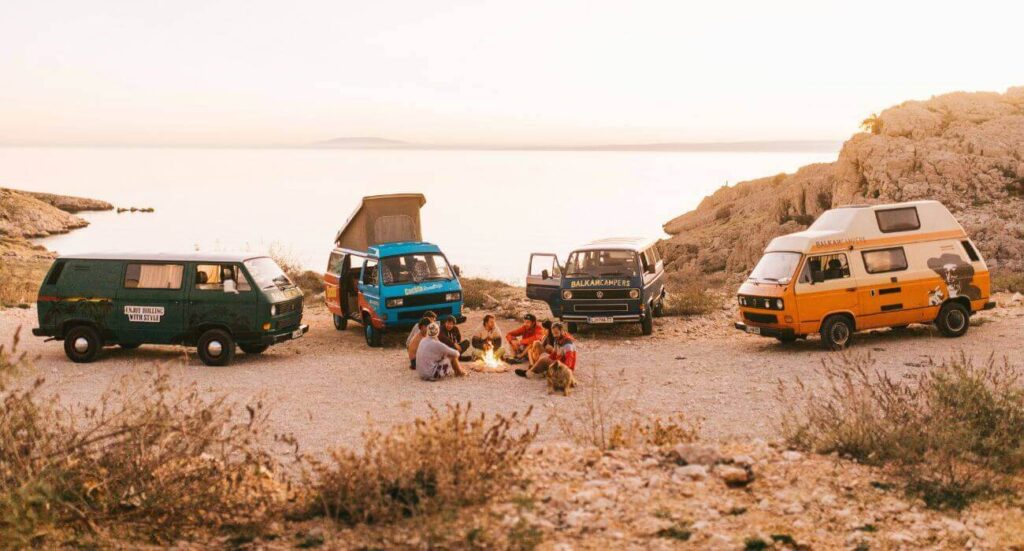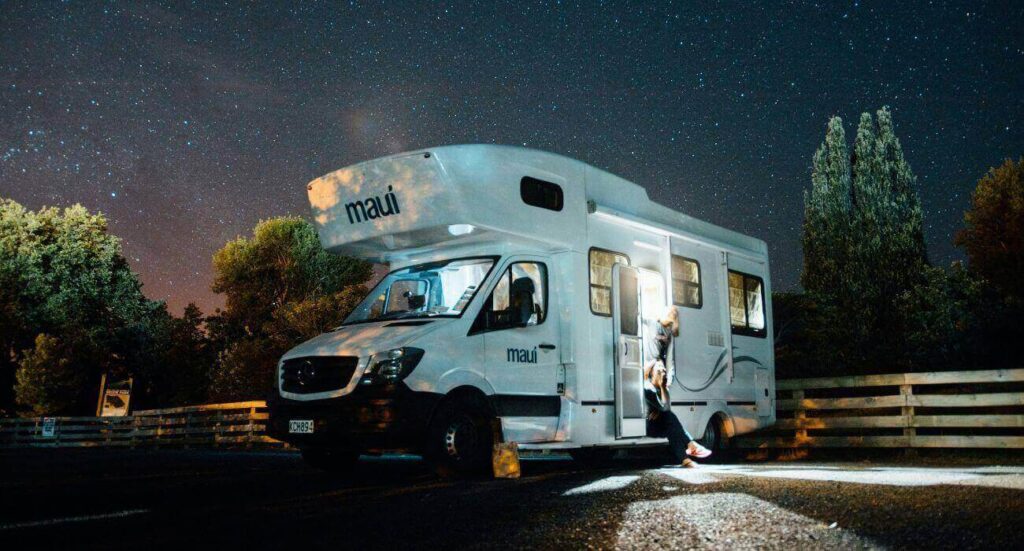As an Amazon Associate, I earn from qualifying purchases
RVs and campers differ mainly in size, with RVs being larger vehicles like motorhomes, while campers are generally smaller and more compact. Each type of vehicle has its own advantages depending on your specific needs. When considering which option best suits your requirements for travel and accommodation, it’s important to weigh the benefits of an RV vs camper, taking into account factors such as space, amenities, and mobility.
RVs are often chosen for their independence and convenience, as they can be driven independently, while campers are popular for being pulled by a separate vehicle. The decision between an RV and a camper ultimately depends on factors such as size, price, and personal preferences.
Differences Between Motorhome vs Camper

RVs and campers differ mainly in size, with RVs including larger vehicles like motorhomes. Campers, on the other hand, are typically smaller and more compact, making them suitable for different needs.
The main difference between RVs, motorhomes, and campers is their size and type. RVs include bigger types of vehicles, such as motorhomes, while camper trailers are generally smaller and more compact. Each type of vehicle has its own benefits, depending on your specific needs and preferences.
Size And Type
RVs come in various sizes and types, ranging from smaller campervans to larger motorhomes. Campervans, also known as Class B RVs, are typically compact and easy to maneuver. They offer essential amenities and are suitable for solo travelers or couples looking for a compact and versatile option.
On the other hand, motorhomes are larger and more luxurious, offering spacious living areas and additional amenities. They are available in Class A, B, and C categories, with Class A being the largest and most luxurious option. Class A motorhomes resemble a bus or luxury coach and provide ample space for living, dining, and sleeping areas.
Mobility And Driving
When it comes to mobility and driving, campervans are easier to maneuver and navigate through narrow roads and tight spaces. They provide better fuel efficiency and are suitable for urban exploration and shorter trips. Their compact size allows for easy parking in crowded areas, making them a convenient choice for city dwellers.
On the other hand, motorhomes, especially larger Class A vehicles, can be more challenging to drive and park due to their size and weight. They require more space and attention while maneuvering, making them better suited for longer road trips and stays at spacious campgrounds.
Towing Options
RVs offer various towing options, depending on the type of vehicle. Campervans are usually standalone vehicles and do not require an additional towing vehicle. They are self-contained and provide all the necessary amenities, including sleeping areas, kitchenette, and bathroom.
Motorhomes, on the other hand, require towing a separate vehicle, also known as a towed vehicle or a “toad.” This allows the motorhome owners to have a smaller car for everyday use while keeping their motorhome parked at the campground. Towing a vehicle behind a motorhome provides more flexibility and convenience during your travels.
It’s important to consider your personal preferences, travel plans, and budget when choosing between an RV and a camper. Whether you opt for a compact and maneuverable campervan or a spacious and luxurious motorhome, both options offer unique advantages and a memorable travel experience.
Related: How Much Does a Camper Weigh?
Pros And Cons Between RV vs Campervan

When it comes to choosing between an RV and a camper, there are several factors to consider. Both options have their own set of advantages and disadvantages. In this article, we will explore the pros and cons of each, focusing on costs, maintenance, space and amenities, and insurance.
Costs
One of the primary considerations when deciding between an RV and a camper is the cost. RVs tend to be more expensive upfront compared to campers. They come in various sizes and models, including Class A, Class B, and Class C motorhomes, which offer different features and amenities. Campers, on the other hand, are generally cheaper and come in various types such as travel trailers, pop-up campers, truck campers, and teardrop trailers.
Pros:
- RVs offer more luxurious features and amenities.
- RVs typically have more living space and storage.
- RVs provide a comfortable and convenient travel experience.
Cons:
- RVs require a larger budget and initial investment.
- RVs may have higher fuel costs and maintenance expenses.
- RVs may have more expensive insurance premiums.
Maintenance
When it comes to maintenance, both RVs and campers require regular upkeep to ensure their longevity and proper functioning. However, the level of maintenance required may differ.
Pros:
- Campers are generally easier to maintain due to their smaller size.
- RVs often come with built-in maintenance features and systems.
- Proper maintenance can prolong the lifespan of both RVs and campers.
Cons:
- RVs may require more frequent maintenance due to their larger size and complex systems.
- Both RVs and campers may experience wear and tear, especially with regular use.
- Maintenance costs can add up over time.
Space And Amenities
Space and amenities are crucial factors to consider, especially if you plan on using the vehicle for extended periods or as a full-time living space.
Pros:
- RVs offer more living space, including bedrooms, bathrooms, kitchens, and dining areas.
- RVs often come equipped with various amenities such as air conditioning, heating, and entertainment systems.
- RVs provide a comfortable and spacious living experience.
Cons:
- Campers may have limited living space, especially in smaller models.
- Campers may have fewer amenities compared to RVs.
- RVs may be more suitable for large families or those who prefer more spacious accommodations.
Insurance
Insurance is another important aspect to consider when choosing between an RV and a camper. The cost of insurance will vary based on factors such as the type of vehicle, its value, and your personal circumstances.
Pros:
- RVs may offer more comprehensive insurance coverage options.
- RVs often have higher resale values, which can affect insurance premiums.
- Insurance can provide peace of mind during travels.
Cons:
- RV insurance premiums may be higher compared to campers.
- Campers with fewer amenities and features may have lower insurance costs.
- Insurance premiums may increase with the size and value of the vehicle.
Are campers worth the investment?

Investing in a camper can be a worthwhile decision for individuals or families who enjoy outdoor adventures and travel. Here are several factors to consider when evaluating whether campers are worth the investment:
Cost-Effectiveness: Campers are often more affordable upfront compared to motorhomes or other recreational vehicles. This makes them an attractive option for budget-conscious travelers who want to explore the outdoors without breaking the bank. Additionally, campers typically have lower maintenance costs and insurance premiums than larger motorhomes, contributing to their overall cost-effectiveness.
Flexibility: Campers offer a high level of flexibility in terms of travel destinations and camping experiences. Since they are towed by separate vehicles, campers allow travelers to use their primary vehicle for everyday transportation when not on camping trips. This flexibility enables individuals to explore remote or off-grid locations where larger RVs may be impractical or inaccessible.
Customization: Campers come in various sizes and configurations, ranging from compact teardrop trailers to spacious fifth-wheel trailers. This diversity allows individuals to choose a camper that suits their specific needs, whether it’s a minimalist setup for weekend getaways or a fully-equipped trailer for extended travel. Many campers also offer options for customization and upgrades, allowing owners to personalize their living space according to their preferences.
Outdoor Experience: One of the primary benefits of owning a camper is the opportunity to immerse oneself in the outdoor experience. Campers provide a comfortable and convenient home base for exploring nature, national parks, campgrounds, and other outdoor destinations. Whether it’s hiking, fishing, or simply enjoying the tranquility of the wilderness, campers enhance the overall camping experience by providing shelter, amenities, and a sense of home away from home.
Resale Value: While campers may depreciate over time like any vehicle or recreational equipment, well-maintained models can retain their value reasonably well. This means that owners may recoup a significant portion of their initial investment when selling or trading in their camper in the future. Additionally, the resale market for campers remains robust, with demand remaining steady among outdoor enthusiasts and travelers.
In summary, campers offer a cost-effective, flexible, and customizable option for individuals or families seeking adventure and outdoor experiences. While they require an initial investment, the benefits of owning a camper, including flexibility, customization, and outdoor enjoyment, often outweigh the costs. Ultimately, the decision to invest in a camper depends on personal preferences, travel goals, and budget considerations.
Is it worth buying a pop-up camper?
Deciding whether to buy a pop-up camper depends on your specific camping preferences, travel style, and budget considerations. Here are some factors to consider when evaluating whether a pop-up camper is worth the investment:
Affordability: Pop-up campers are often more affordable than traditional travel trailers or motorhomes. Their relatively low price point makes them an attractive option for budget-conscious individuals or families who want to experience camping without breaking the bank.
Compact and Lightweight: Pop-up campers are typically lightweight and compact when collapsed, making them easy to tow and store. This makes them suitable for towing with a wide range of vehicles, including SUVs and smaller trucks, without requiring a heavy-duty towing setup.
Versatility: Pop-up campers offer versatility in terms of camping locations and terrain. Their lightweight construction and compact size allow them to access remote or off-grid camping spots that may be inaccessible to larger RVs or trailers. Additionally, their collapsible design makes them suitable for storage in garages or tight spaces when not in use.
Amenities: While pop-up campers may not offer the same level of amenities as larger RVs, many models come equipped with basic features such as sleeping areas, dinettes, and storage cabinets. Some may also include additional amenities like small kitchens, sinks, and even bathrooms, depending on the model and manufacturer.
Outdoor Experience: Pop-up campers provide a closer connection to the outdoor environment compared to traditional RVs or motorhomes. With their canvas walls and windows, pop-up campers allow campers to experience the sights, sounds, and smells of nature while still providing shelter and comfort.
Maintenance and Upkeep: Pop-up campers generally require less maintenance and upkeep compared to larger RVs or motorhomes. With fewer mechanical components and systems, there are fewer things that can potentially go wrong. Additionally, pop-up camper owners can often perform routine maintenance tasks themselves, saving on repair costs.
Resale Value: Well-maintained pop-up campers can retain their value reasonably well over time. While they may depreciate like any vehicle or recreational equipment, their relatively low initial cost means that owners may recoup a significant portion of their investment when selling or trading in their camper in the future.
In conclusion, buying a pop-up camper can be worth it for individuals or families seeking an affordable, versatile, and immersive camping experience. Whether you’re a seasoned camper or new to the outdoor lifestyle, a pop-up camper offers the opportunity to explore nature and create lasting memories without breaking the bank. However, it’s essential to carefully consider your camping needs, preferences, and budget before making a purchase decision.
RV or Camper
Choosing one among them depends on your needs and preferences. Driving and Living: An RV comes with a built-in driving compartment making it all-in-one convenience. On the other hand, the Camper requires an additional towing vehicle.
Size and Facilities: RVs provide more luxurious facilities to make your trips comfortable and memorable. You can enjoy full kitchens, bathrooms, multiple sleeping areas, and entertainment systems, whereas Camper offers basic amenities like kitchens and bathrooms and generally has less space.
Cost: RVs are expensive, but they offer more, while the camper is budget-friendly as it costs less.
Flexibility and Versatility: RVs are suitable for long-term travel and living in them because of all the amenities. However, the camper is advantageous if you want to explore remote locations, providing a more authentic camping experience for outdoor enthusiasts.
To summarize, choose RV if you prioritize comfort and luxury. On the other hand, choose Camper if you prefer a more minimalistic camping experience or want a budget-friendly option. Ultimately, make an informed decision based on your travel goals, budget, and preferences to create memorable adventures on the open road.
Related: Top 10 Best RV Bike Racks
Frequently Asked Questions For Rv Vs Camper
What Is The Difference Between Rv Camper?
The main difference between an RV, motorhome, and camper is size. RVs, including motorhomes, are larger vehicles, while campers are smaller and more compact. Each type of vehicle has its own benefits, depending on your needs.
Is It Cheaper To Pull A Camper Or Drive An Rv?
It is generally cheaper to pull a camper than drive an RV. Camper trailers are more compact and require less fuel consumption compared to larger motorhomes.
Is A Pull Behind Camper Considered An Rv?
The pull behind camper is considered an RV because it falls under the category of recreational vehicle, along with motorhomes. While motorhomes have a built-in engine, travel trailers like pull behind campers require another vehicle to tow them.
Why Is It Called An Rv?
An RV is short for “recreational vehicle,” which is a motor vehicle or trailer with living quarters designed for accommodation.
Conclusion
RVs and campers each have their own unique qualities and benefits, depending on individual preferences and needs. While RVs offer larger sizes and more amenities, campers are generally smaller and more compact. Both options have their advantages when it comes to cost, space, maintenance, and fuel efficiency.
Ultimately, the choice between RV and camper boils down to personal preference and specific requirements. Whether you’re looking for a luxurious and spacious motorhome or a smaller and more cost-effective camper, both options provide an opportunity for memorable and enjoyable adventures on the road.
As an Amazon Associate, I earn from qualifying purchases

